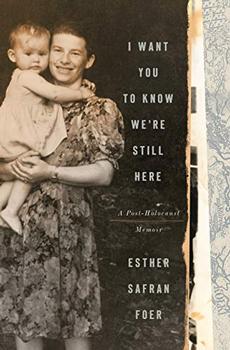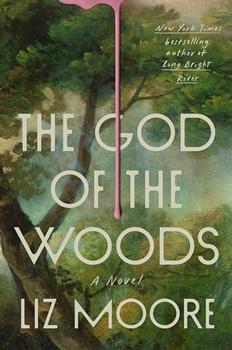Write your own review!
Nancy L. (Staunton, VA)
Still Here
Esther Safran Foer has written an emotionally charged memoir of her family's journey after the Holocaust. It is a story filled with longing: longing to see the places in Ukraine, the shetls, where her extended family lived; longing to here the stories and trace the paths that distant relatives have taken; and longing to find the Ukrainian Christian who hid her father from the Nazis. But what she longs for most of all is to know her own story, to understand what her young parents endured to survive the Holocaust and find their way to the US. Her title words say it all, "We are still here".
Rosemary C. (Golden, CO)
A Poignant Memoir
I thoroughly enjoyed this very heartfelt, readable story-even though it is a tough one. Esther Safran Foer compellingly describes her search for the story of her father's first wife and child and how he survived the Holocaust. The book will appeal to anyone who has grown up in a home with secrets, anyone who has survived tragedy, or anyone who is interested in this period of history. It is extremely well-written and poignant and will appeal to readers of all ages. I can imagine some intense book club discussions.
 Betty T. (Warner Robins, GA)
The Safran Family is Still Here
Betty T. (Warner Robins, GA)
The Safran Family is Still Here
This beautifully written book flowed so smoothly I felt was having coffee with Ms. Foer as she told her story. I have read countless stories of the Holocaust yet from each I learn something new. The biggest "take-away" for me from this book was that "life was all about moving forward" which may explain why many survivors did not talk about the past. The book is filled with many truly memorable and heartfelt statements. There are stories of heroism and stories of shame (such as how the survivors were so poorly treated in American DP camps that President Truman actually ordered an investigation of the problem). The Jewish people have many traditions of which many we do not know why the tradition exists. I loved Ms. Foer's take on why we leave stones on a grave instead of flowers, and the significance of a mezuzah on our doorposts.
One of the most poignant parts of the book, at least to me, is the statement "Jews are concerned more with memory than with history". We believe that a person never really dies as long as someone remembers her/his name. This is why Foer was so determined to learn the name of her half-sister that was murdered by the Nazis. Someone, somewhere must know her name. A little girl who had barely lived must be remembered.
"History is public. Memory is private." While Ms. Foer's parents chose to keep their memories private, fortunately for us she chose to share the memories she uncovered and to keep these stories alive.
Thank you to BookBrowse for an advance copy of this book. All opinions are my own. I highly recommend this book.
Gunta K. (Glens Falls, NY)
I Want Youto Know We're Still Here
This tome by Esther Safran Foer is very detailed about her extended family just about all of whom were destroyed in the Holocaust, killed in mass graves but their love for their beliefs not destroyed. Her unrelenting search for survivors of her large family, her poignant verbal cameos of humor with and about her mom are mesmerizing. What is more important is her never give up search on the European Continent for her family members. She has found the graves of many in the most impossible places. This is dedication to one's family, the belief in the good future and teaching young generations of what is possible to achieve if one has a heart and soul and the belief in continuity of life. The life one believes in.
Barbara B. (Evansville, IN)
Powerful Ancestral Memoir
I have a fascination for historical memoirs, and this one is wonderful. It is full of holocaust history and is specifically knowledgeable about the small Ukrainian towns and their citizens destroyed and murdered by the Nazis.
Astonishing and overwhelming discoveries were made by the author, Esther Safran Foer, after she and her sons began questioning her mother and searching her family's history in Ukraine. Esther and her sons felt a link to their past, and in the process encountered distant relatives and acquaintances who provided valuable information. It is true that ancestral research can provide powerful results.
Susan P. (Mount Vernon, WA)
A Poignant Family Journey
This is a story of a woman's journey, emotional, spiritual and physical, to find details of her parent's story and learn about the family members she lost to the holocaust. It is interesting, moving and profound. Highly recommend this one.
Colleen L. (Casco, ME)
An Amazing Read
Ester Foer's search for her family history is both inspiring and challenging. Her parents had lived through the Holocaust and were enigmatic about their experiences. Her father died and she was unaware of the circumstances until she was much older. Over the years, Foer did intense research across several continents to unearth her parent's history.
I have read many books about the Holocaust - both fiction and non-fiction. Most are written about survivors from the death camps and their horrific experiences. What I haven't read much of, nor has there been much written about, concerns the post-Holocaust. This was a time that was just as hard for the surviving Jews and one that people just assume had to be easier given that the death camps were closed. Foer's book highlights this difficult time period and opened my eyes to a situation I knew little about.
Foer's book is a true life detective story. Her writing is just as gifted as her three sons who are also writers. It takes her years to finally piece her family's past in place. You can feel her emotion when she finally arrives at her father's ancestral home land and meets the family that saved her father.
This is an important book that needs to be added to the catalogue of "must-read" Holocaust books. It covers a period that most readers know little about. I highly recommend this book and am grateful for the opportunity to read it and learn more about this terrible time in World War II.
patty claire
Stories and memories are our history
Memories and the stories that make up her family's history are missing from Esther Safran Foer's childhood. When she discovers that her father had another wife and child she sets out to find out what happened to them and to learn their names. Her parents lost their entire family and all that was familiar to them during the Holocaust. The shtel's that they knew growing in Ukraine no longer exist, they were completely destroyed and burned to the ground. No Jews live there today. How did her parents survive and who risked their life to help them.
The author takes us along with her on her journey to find the spot where these shtels once existed and anyone who might have known any member of her family. Each mass grave site is located and prayers are said, songs are sung and a photograph of her family is left to tell the dead "that we're still here".




